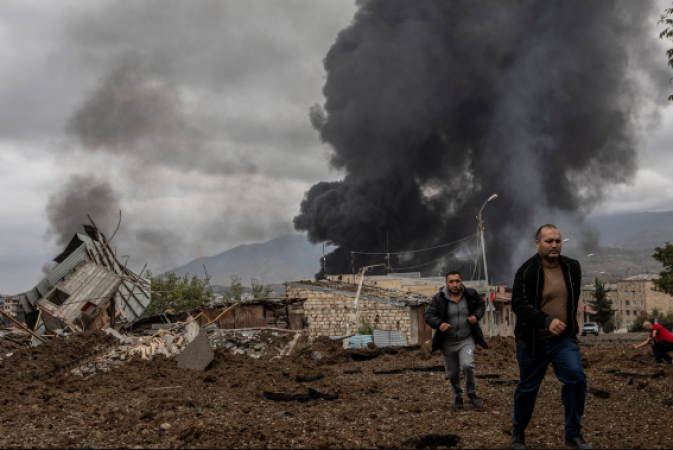
UNO: In a poignant scene of urgent deliberation, Armenia and Azerbaijan engaged in a heated confrontation during an emergency UN Security Council meeting on Wednesday. At the heart of their dispute lies the fate of 120,000 lives hanging in the balance within the Nagorno-Karabakh region. Armenia stands as the voice of these imperiled individuals, insisting that Azerbaijan's unyielding blockade has precipitated a profound humanitarian catastrophe.
The Lachin Corridor, a slender lifeline connecting the mainly Armenian-populated Nagorno-Karabakh to Armenia itself, has been rendered inaccessible since July 15th. What was once a path for hope, unity, and sustenance has transformed into a barrier, leaving the people of Nagorno-Karabakh trapped in a grim struggle for basic necessities: food, medicine, and even electricity.
The roots of this conflict stretch back through decades of strife and tension. Nagorno-Karabakh, while geographically part of Azerbaijan, has long been the focus of a fierce ethnic and territorial struggle. The region and its surroundings slipped from Azerbaijan's grasp in the wake of a separatist conflict, with ethnic Armenian forces gaining control, backed by Armenia's military. A tenuous armistice brokered by Russia in 2020 redefined the landscape, returning control to Azerbaijan but leaving the Lachin Corridor as the sole conduit linking Nagorno-Karabakh to Armenia.
Also Read: Introducing X's Innovative "Highlights" Tab: Elevating Your Profile Like Never Before
As the UN Security Council convened, impassioned pleas echoed through the chamber from nations worldwide. They implored Azerbaijan to unlock the path that could save lives. Even the International Court of Justice's orders resounded, guiding their call to reopen the corridor. A unanimous chorus rose, urging Armenia and Azerbaijan to transcend their nearly three-decade-long enmity, to seek a diplomatic resolution for the greater good.
Although the Security Council refrained from issuing an official statement, the meeting's chair, US Ambassador Linda Thomas-Greenfield, emphasized the significance of the unified demand for the Lachin Corridor's reopening. Yet, words alone are not enough, as the urgency of action takes center stage.
Edem Wasornu, the UN's humanitarian coordinator, brought a stark reminder to the council's attention. The International Committee of the Red Cross, the sole international entity granted access to the region, reported their inability to deliver essential aid since June 14th. The corridor's closure starkly violates international humanitarian law, which mandates the swift provision of assistance to those in need.
Also Read: US Urges Iran to Cease Drone Sales to Russia Amid Concerns for Ukraine Conflict
Armenia's Foreign Minister, Ararat Mirzoyan, painted a chilling picture of the consequences of this blockade. He spoke of a region brought to its knees, its economy stilled, livelihoods shattered, and its vulnerable members—women, children, and the elderly—forced into lengthy queues just to secure sustenance. Even the flow of electricity, a fundamental lifeline, has been severed since January 9th.
Mirzoyan invoked a haunting phrase, "starvation is the invisible genocide weapon." He quoted a report suggesting that the blockade amounts to a genocidal act, a fate that could extinguish a community within weeks. He issued a plea, urging the Security Council to live up to its mandate of preventing such horrors, to act now before it's too late.
Yet, Azerbaijan's UN Ambassador, Yashar Aliyev, vehemently denied the allegations. He framed Armenia's claims as a calculated political maneuver, aimed at undermining Azerbaijan's sovereignty. Aliyev justified the roadblock as a means to safeguard his nation's integrity, preventing illegal military activities and the flow of arms.
The room was charged with emotion as both sides presented their narratives. Each delegation painted a different reality, each with its share of suffering and responsibility. Amid the impassioned exchanges, a single truth emerged—human lives hang in the balance, waiting for a resolution to break the cycle of despair.
Silvio Gonzato, the European Union's deputy UN ambassador, voiced a plea that transcended the political fray. Humanitarian access, he implored, should never be caught in the crossfire of politics. He reminded the council that the Lachin Corridor's reopening was more than a political act—it was a lifeline for the innocent, a promise of hope amidst desolation.
Also Read: Inferno Horror: Russian Petrol Station Blaze Claims 30 Lives and Leaves Scores Injured
As the meeting drew to a close, the world watched with bated breath. The clash of emotions, the weight of responsibility, and the call for compassion echoed in the hearts of those present and the millions they represent. And as the delegates dispersed, the question lingered: could diplomacy bridge the chasm of decades-old conflict and prevent the impending catastrophe?"